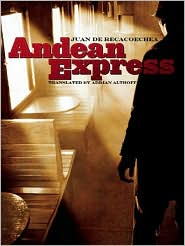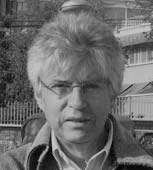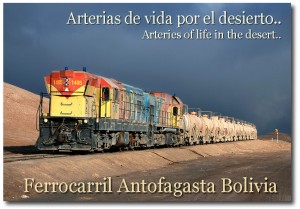“In the life of a traveler, the impossible is always possible; everything depends on whether you have enough bills on hand or how badly you want to work out your problems.”
 The twenty-four hour train ride from La Paz, Bolivia, to Arica, Chile, through the Andes at an altitude of up to 16,000 feet, from which the railway descends to the sea, provides the “closed room” setting for a murder which takes place in 1952, somewhat akin to Agatha Christie’s Murder on the Orient Express (1934). The key difference, however, is that the passengers on the Andean Express are, for the most part, local people traveling for a variety of reasons, and not wealthy Europeans traveling for pleasure. Their issues and resentments are local, based on their long histories with the victim, a man so loathsome that few can find anything positive to say about him. “Killing Alderete would not be murder; it would be a settling of accounts,” one remarks.
The twenty-four hour train ride from La Paz, Bolivia, to Arica, Chile, through the Andes at an altitude of up to 16,000 feet, from which the railway descends to the sea, provides the “closed room” setting for a murder which takes place in 1952, somewhat akin to Agatha Christie’s Murder on the Orient Express (1934). The key difference, however, is that the passengers on the Andean Express are, for the most part, local people traveling for a variety of reasons, and not wealthy Europeans traveling for pleasure. Their issues and resentments are local, based on their long histories with the victim, a man so loathsome that few can find anything positive to say about him. “Killing Alderete would not be murder; it would be a settling of accounts,” one remarks.
Author Juan de Recacoechea, the most popular author in Bolivia, and one of only a handful of Bolivian authors to have had his novels translated into English, creates a broad picture of Bolivian society through his depiction of the passengers on the train–their attitudes, their goals, their expectations, and the lengths to which they might go to ensure that they will be successful in reaching their goals. In a novel notable for the clarity of the prose and the simplicity of the narrative structure, the author tells a fast-paced story. The murder is not a mystery to be solved so much as it is a question of whether the killer will be able to escape prosecution for killing a man everyone believes deserves to have been killed. The biggest mysteries here are what took people so long to act against him and how much the passengers may be willing to close their eyes to let the murderer escape prosecution.
their goals. In a novel notable for the clarity of the prose and the simplicity of the narrative structure, the author tells a fast-paced story. The murder is not a mystery to be solved so much as it is a question of whether the killer will be able to escape prosecution for killing a man everyone believes deserves to have been killed. The biggest mysteries here are what took people so long to act against him and how much the passengers may be willing to close their eyes to let the murderer escape prosecution.
Among the passengers are Ricardo Beintigoitia, a recent high school graduate who is taking the trip to celebrate the end of the school. He shares a cabin with Rev. Daniel Moreno, a Franciscan priest, who may not be who he seems to be. Ricardo is attracted to Gulietta Carletti, also aged eighteen, who has just been married to Don Nazario Alderete, a much older man she despises and who she and her mother believe is responsible for the death of her father. Felipe Trellez, Ricardo’s uncle, a former Bolivian ambassador to France, is on the train. Edmundo Rocha, Alderete’s half-brother, injured and crippled in an accident, hates Alderete, who pensioned him off with barely enough money to cover the burial of his mother when he was injured. Lalo Ruiz, a poker player, from whom Alderete stole property, is traveling, along with Petko Danilov, a Russian loan shark, and “the Marquis,” a man who despises Alderete for stealing his wife. The Marquis is accompanied by Anita, La Paz’s most famous madam, who also hates Alderete. With no dearth of motives, one wonders only why it took so long to eliminate Alderete.
 The author keeps the narrative moving, creating enough information about the various characters that the reader will appreciate the overlapping of stories and motives. None of the characters are fully developed, but they are developed enough to satisfy the needs of the story and keep the reader intrigued. The dialogue, well translated, makes the circumstances feel natural, however bizarre they may seem, with a classic line included at a key moment: “I can’t believe it. This could be a Billy Wilder comedy.”
The author keeps the narrative moving, creating enough information about the various characters that the reader will appreciate the overlapping of stories and motives. None of the characters are fully developed, but they are developed enough to satisfy the needs of the story and keep the reader intrigued. The dialogue, well translated, makes the circumstances feel natural, however bizarre they may seem, with a classic line included at a key moment: “I can’t believe it. This could be a Billy Wilder comedy.”
Readers new to de Recacoechea will appreciate his clear vision of his story’s direction and the lack of complication in either style or structure to get in the way of the quick pace and the action. He creates characters who reveal much about life in Bolivia without being easy stereotypes, and he presents a conclusion which raises as many questions as it solves. The train ride from La Paz to Arica is fascinating (see notes below for a video of this ride) as it moves through various climate zones and unique geographical formations, and train buffs will enjoy its descriptions as much as lovers of international mysteries will enjoy the assortment of unusual characters. Though this novel is not as complex in character and theme as America Visa, it is a wonderful addition of Juan de Recacoechea’s work in English, and great fun to read.
Notes: Also reviewed here: de Recacoechea’s AMERICAN VISA
The author’s photo appears on http://www.calabashfestival.org
The Ferrocarril Antofagasta Bolivia may be seen here: http://www.markusworldwide.ch
Want to take the same train ride? This video takes a passenger train on the same trip, on the same track, from Arica to La Paz. The scenery is most unusual.
